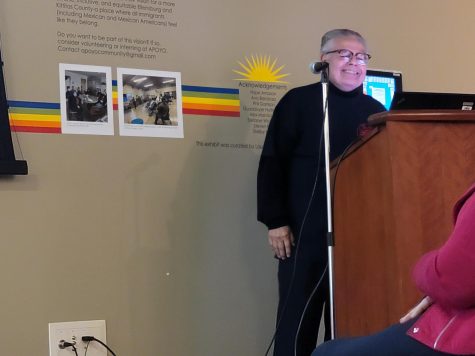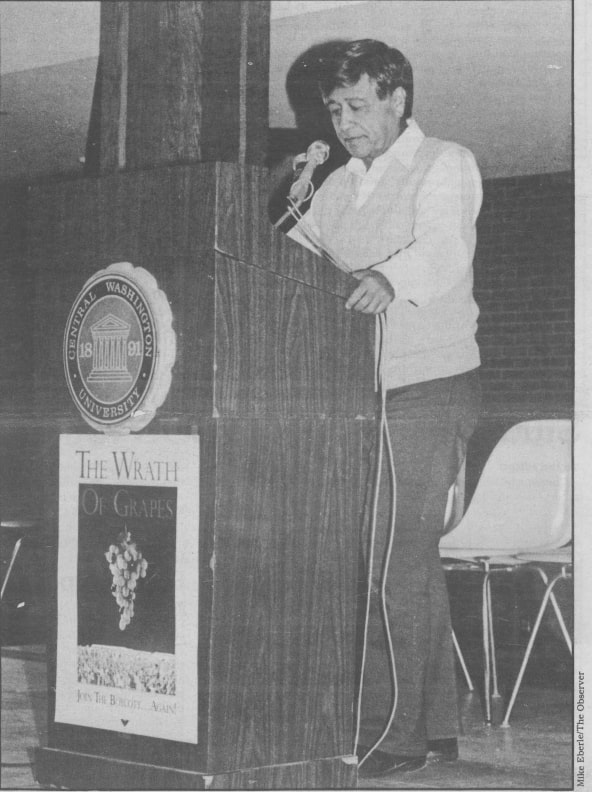MEChA de CWU stands the test of time
October 26, 2022
A sense of family hung in the air as students and community members entered the Museum of Culture and Environment in Dean Hall on Thursday, Oct. 20.
After hugging several of the audience members, Movimiento Estudiantil Chicana/o de Aztlán (MEChA) advisor Dr. Gilberto Garcia began to discuss the achievements and struggles faced by the organization.
The chapter was founded in 1972, and the presentation included stories of low funding, hosting Cesar Chavez and questioning choices in related programs.
“Most of our LatinX students are first generation and seeing how long MECHA has been here at this institution, it gives us something to connect to in an environment that is so new,” co-chair of MEChA Citlali Gonzalez-Arroyo.
Gonzalez-Arroyo said she was proud of Dr. Garcia for sharing his story at CWU and was grateful to see so many people at the gathering.
According to the chapter website, MEChA is a self-empowerment organization for people of Mexican heritage.
They believe the best way to achieve self empowerment is through a fusion of traditional higher education, political action and knowledge of Mexican culture and history.
Historic action
Garcia said that MEChA got much of their inspiration from the civil rights movements of the ‘60s.
Dr. Garcia said he credited MEChA with applying the pressure that led to creating the ethnic studies program.
According to his presentation, members of MEChA, referred to as Mechistas, drew attention to the plights of minority students in 1972 by hosting a Symposium on Minority Affairs.
The symposium focused on outreach to the white community and educating them on struggles faced by minorities on CWU’s campus.
In 1974, MEChA de CWU had attracted the attention of Cesar Chavez, a well known advocate for unionization and the fair treatment of immigrants.
According to Garcia, Chavez was speaking at a National Farm Workers Association event in Yakima then came to meet Mechista activists on campus and encouraged them to support the union.
“The history lesson gave a greater appreciation for what we stand for and the wonderful things that this organization has been a part of and created,” Gonzalez-Arroyo said.
He even wrote an opinion piece for The Observer’s predecessor, The Campus Crier, urging students to support a boycott organized by NFWA.
By 1975, CWU offered their first Chicano studies class, Chicano History and Culture. Garcia credited past Mechista activists with the change.
“Students organizing to put pressure (on the administration), the university will pay attention,” Garcia said.
Looking forward
According to Gonzalez-Arroyo, her personal goals for MECha this year include bridging the gap between culture and higher education and offering a helping hand.
“We are here as support, as a resource, as a means to find comfort in an institution that loves to plaster diversity and inclusion propaganda yet invests zero dollars on one of our most vital resources,” Gonzalez-Arroyo said.
Garcia was hired in 2007 as a political science professor and director for the Center for Latino/Latin American Studies.
After publicly criticizing the administration for his $2,000 budget, he was removed as director and replaced by a White professor within one year, according to Garcia.

Museum of Culture and Environment. (Andrew Ulstad)
Garcia said the center is still underfunded. He said he has learned in conversations with the current director, Dr. Christina Torres Garcia, that she was hired with a zero budget for the center. He said that the center has had one minor victory recently: a return to a $2,000 budget.
According to data compiled by the National Center for Education Statistics, CWU’s student population is about 18% Hispanic. When an institution reaches 25%, it can apply to be recognized by the Department of Education as a Hispanic Serving Institution and receive extra federal funding.
Garcia said he would like to see the university reach that point.
“One of the things about this Hispanic Serving Institution, the idea, is misunderstood,” he said. “We as a community will be bringing in funding to this university that you can use for recruitment, that you can use for … services that you want to provide to the student population.”
Garcia said he hopes recurring recruitment drives by MEChA will help achieve that goal, just as they helped achieve the goals of Mechistas in the ‘70s.

